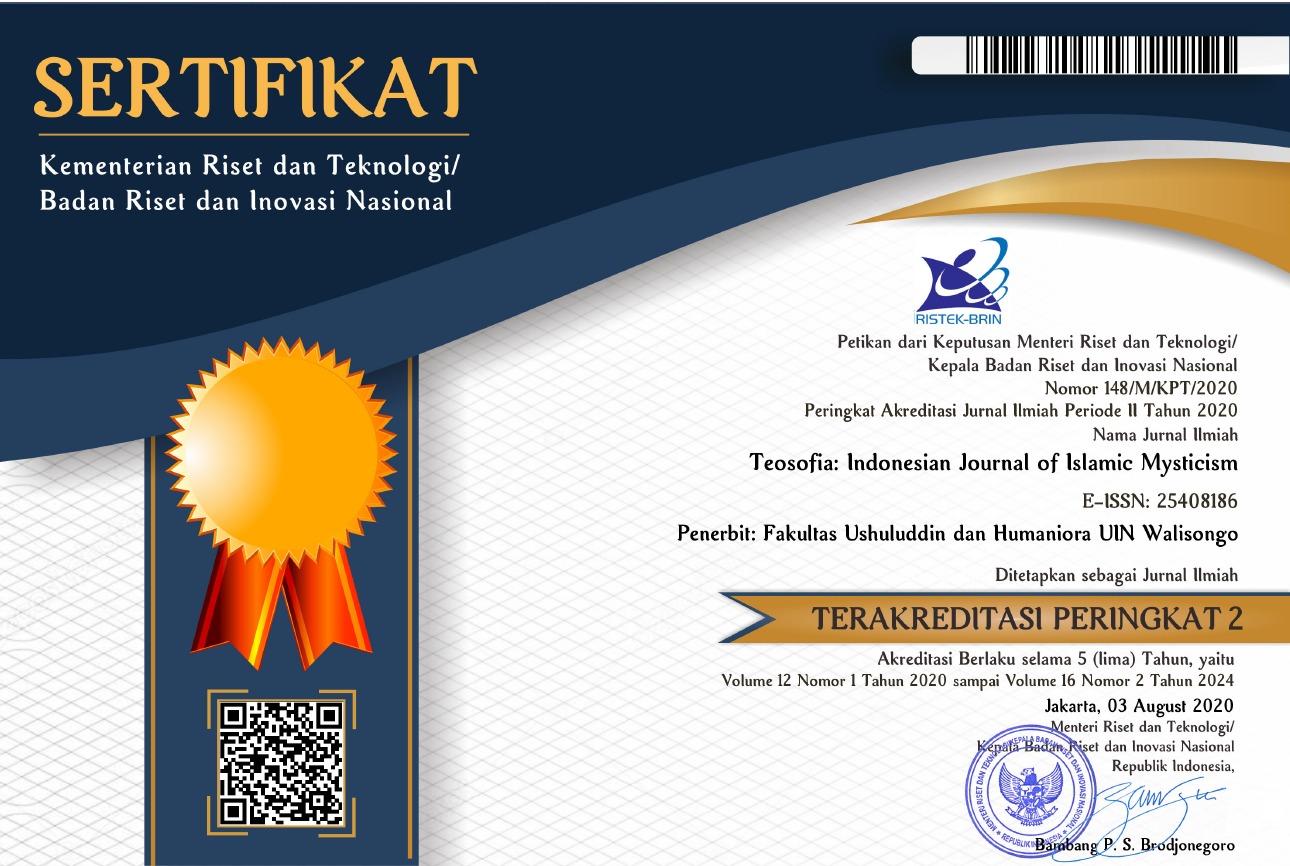Between Fidelity and Reform: Muḥammad Qāsim Nanotvi's (1833–1880) Rearticulation of Waḥdat al-Wujūd
DOI:
https://doi.org/10.21580/tos.v14i1.27370Keywords:
Qasim Nanotvi, waḥdat al-wujūd, waḥdat al-shuhūd, sufi metaphysics, qua-theoretic modelAbstract
Muhammad Qasim Nanotvi (1833–1880) is primarily recognized as the founder of the Deoband seminary. His engagement with waḥdat al-wujūd reveals a neglected philosophical project that seeks to reconcile mystical intuition with rigorous metaphysical reasoning. Drawing on the intellectual legacy of Shāh Walīullāh al-Dihlawī and Ḥājī Imdādullāh Muhājir Makkī, Nanotvi affirms that all existence depends on God, yet rearticulates this within a theological structure that safeguards divine transcendence. This article examines Nanotvi's reinterpretation of waḥdat al-wujūd (the unity of being), a foundational yet contested concept in Islamic metaphysics and Sufi thought. Employing a historical-critical approach, this study reveals that Nanotvi does not fully endorse waḥdat al-wujūd but rearticulates it as the unity of the attribute of existence (ṣifāt al-wujūd), emphasizing that all existence depends on God while preserving divine transcendence and ontological distinctions between God and creation. By focusing on the attribute of existence, Nanotvi offers a systematic response to ontological debates, avoiding the controversies surrounding waḥdat al-wujūd, while maintaining the spiritual depth of this concept.
Contribution: The findings contribute to a deeper understanding of how Islamic thinkers navigate complex metaphysical questions, offering valuable insights for addressing the tensions between mysticism and orthodoxy.
Downloads
References
Abrahamov, Binyamin. Divine Love in Islamic Mysticism: The Teachings of Al-Ghazāli and Al-Dabbagh. London and New York: Routledge, 2003.
Al-Dihlawī, Shāh Walīullāh. Al-Khayr Al-Kathīr [The Abundant Good]. Uttar Pradesh: Madīna Press, 1933.
———. Al-Tafhīmāt Al-Ilāhiyya [The Divine Understandings]. Uttar Pradesh: Madīna Barqī Press, 1936.
Ali, Mukhtar H. Philosophical Sufism: An Introduction to the School of Ibn Al-ʿArabī. London & New York: Routledge, 2022.
Amili, Rifqi Miftahul. “Waḥdat Al-Wujūd in The Perspective of Shāh Walī Allāh Al-Dihlawī.” Refleksi: Jurnal Kajian Agama Dan Filsafat 23, no. 2 (October 17, 2024): 325–46. https://doi.org/10.15408/ref.v23i2.41524.
Ansari, Muhammad Abdul Haq. Sufi Perspectives on Experience and Reality. New Delhi: Markazi Maktaba Islami Publishers, 2010.
———. Sufism and Sharīʿa: A Study of Shaykh Aḥmad Sirhindī’s Efforts to Reform Sufism. Leicester: The Islamic Foundation, 1986.
Bäck, Allan T. On Reduplication: Logical Theories of Qualification. Leiden: E. J. Brill, 1996.
———. “Qualification.” In The Routledge Companion to Medieval Philosophy, edited by Richard Cross and JT Paasch. London and New York: Routledge, 2021.
Baig, Sohaib. “Printing a Transregional Ṭarīqa: Haji Imdadullah Makki (d. 1899) and Sufi Contestations from Thana Bhavan to Istanbul.” International Journal of Islam in Asia 3, no. 1–2 (September 14, 2023): 21–42. https://doi.org/10.1163/25899996-20230011.
Baljon, Johannes Marinus Simon. Religion and Thought of Shāh Walī Allāh Dihlawī. Leiden: Brill, 1986.
Böwering, Gerhard. “ʿAlī Hamadānī.” Encyclopædia Iranica, 1985. https://www.iranicaonline.org/articles/ali-b-32/.
Cheifetz, Haruka. “Al-Shaʿrānī’s Defence of Ibn ʿArabī in Context: Interpreting ‘the Oneness of Existence’ (Waḥdat Al-Wujūd) as Experiential Oneness.” Journal of Sufi Studies 12, no. 2 (October 10, 2023): 182–215. https://doi.org/10.1163/22105956-bja10033.
Chittick, William C. “A History of the Term Waḥdat Al-Wujūd.” In In Search of the Lost Heart: Explorations in Islamic Thought, edited by Mohammed Rustom, Atif Khalil, and Kazuyo Murata, 71–88. New York: State University of New York Press, 2012.
———. “Rūmi and Waḥdat Al-Wujūd.” In Poetry and Mysticism in Islam: The Heritage of Rūmī, edited by Amin Banani, Richard Hovannisian, and Georges Sabbagh, 70–111. Cambridge: Cambridge University Press, 1994.
———. The Self-Disclosure of God: Principles of Ibn Al-’Arabi’s Cosmology. Albany, NY: Suny Press, 1998.
———. “Waḥdat Al-Wujūd in India.” In Ishraq: Islamic Philosophy Yearbook 3, 29–40. Moscow: Vostochnaya Literatura Publisher, 2012.
Dagli, Caner K. Ibn Al-ʿArabī and Islamic Intellectual Culture. From Mysticism to Philosophy. London and New York: Routledge, 2016.
Dhanani, Alnoor. The Physical Theory of Kalām: Atoms, Space, and Void in Basrian Muʿtazilī Cosmology. Leiden: E. J. Brill, 1994.
Faruque, Muhammad U. “Sufism Contra Shariah? Shāh Walī Allāh’s Metaphysics of Waḥdat Al-Wujūd.” Journal of Sufi Studies 5, no. 1 (May 23, 2016): 27–57. https://doi.org/10.1163/22105956-12341282.
Haq Ansari, Abdul. “Shah Waliy Allah Attempts To Revise Wahdat Al- Wujud.” Arabica 35, no. 2 (1988): 197–213. https://doi.org/10.1163/157005888X00341.
Heer, Nicholas L. The Precious Pearl: Al-Jāmī’s Al-Durra Al-Fākhira, Together with His Glosses and the Commentary of ʿAbd Al-Ghafūr Al-Lārī. New York: State University of New York Press, 1979.
Izutsu, Toshihiko. “An Analysis of Waḥdat Al-Wujūd: Toward a Metaphilosophy of Oriental Philosophies.” In Creation and the Timeless Order of Things: Essays in Islamic Mystical Philosophy. Oregon: White Cloud Press, 1994.
Jāmī, ʿAbd al-Raḥmān. Naqd Al-Nuṣūṣ Fī Sharḥ Naqsh Al-Fuṣūṣ [Critique of the Texts in Commentary on the Engraving of the Gems]. Edited by William C. Chittick. Tehran: Imperial Iranian Academy of Philosophy, 1977.
Javānī, Hujjat Allāh. “Sufism in the Indian Subcontinent.” In Sufism: An Entry from Encyclopaedia of the World of Islam, edited by Gholamali Haddad Adel, Mohammed Jafar Elmi, and Hassan Taromi-Rad. London: EWI Press Ltd, 2012.
Jumat, Matussein Haji. “The Doctrine of Wahdatul Wujud: The Issue of Contamination of the Study of Islamic Sufism with Greek Philosophy.” Journal of Social Transformation and Regional Development 3, no. 2 (2020): 214–21. https://publisher.uthm.edu.my/ojs/index.php/jstard/article/view/8028.
Knysh, Alexander. Ibn ʿArabī in the Later Islamic Tradition. The Making of a Polemical Image in Medieval Islam. New York: State University of New York Press, 1999.
Labooy, Guus H. Christology and Atonement: A Scotistic Analysis. London: Lexington Book and Fortress Academic, 2024.
Lumbard, J. E. B. Aḥmad Al-Ghazāli, Remembrance, and the Metaphysics of Love. New York: State University of New York Press, 2016.
———. “From Hubb to LhringIshq: The Development of Love in Early Sufism.” Journal of Islamic Studies 18, no. 3 (September 1, 2007): 345–85. https://doi.org/10.1093/jis/etm030.
Makkī, Ḥajī Imdādullāh Muhājir. “Risāla Dar Bayān Waḥdat Al-Wujūd”, Kulliyyāt-e Imdādiyya [The Comprehensive Works of Imdād]. Karachi: Dār al-Ishāʿat, 1976.
———. Tasavvuf Kütüphanesi. Translated by Ahmed Avni Konuk, 2015.
Mansouri, Mohammad Amin. “Sufism vs. Monism in ʿAzīz-i Nasafī’s Works.” Iranian Studies 57, no. 3 (July 4, 2024): 360–76. https://doi.org/10.1017/irn.2024.2.
Naeem, Fuad S. “Interreligious Debates, Rational Theology, and the ʿUlamaʾ in the Public Sphere: Muḥammad Qāsim Nānautvī and the Making of Modern Islam in South Asia.” Georgetown University, 2015. hdl.handle.net/10822/761512.
Nanotvi, Muḥammad Qāsim. Ḥujjat Al-Islām [The Proofs for Islam]. Uttar Pradesh: Kutub Khāna-e Iʿzāziyya, 1940.
———. Jamāl-e Qāsimī [The Beauty of Qāsim]. Raipur: Kutub Khāna-e Raḥīmiyya, n.d.
———. “Qiblah Numā” [The Qibla Direction] in Maqālāt-e Ḥujjat Al-Islām [Works of Ḥujjat Al-Islām Qāsim Nanotvi]. Multan: Idāra-e Ta’līfāt-e Ashrafiyya, 2019.
Nizami, Moin Ahmed. Haji Imdādullāh. New Delhi: Oxford University Press, 2024.
Qasmi, Mohd. Azam. “Molana Mohd. Qāsim Nanautvi’s Contribution to Islamic Thought with Special Reference to Al-Kalam.” Aligarh Muslim University, 1988.
Rizvi, Sayyid Athar Abbas. Shāh Walī Allāh and His Times. Canberra: Maʿarifat Publishing House, 1980.
Rubio, Daniel. “In Defence of Qua-Christology.” Religious Studies, January 10, 2024, 1–15. https://doi.org/10.1017/S0034412523001075.
Rustom, Mohammed. “Is Ibn Al-‘Arabī’s Ontology Pantheistic?” Journal of Islamic Philosophy 2, no. 1 (2006): 53–67. https://doi.org/10.5840/islamicphil2006216.
Sabra, Abdelhamid I. “The Simple Ontology of Kalām Atomism: An Outline.” Early Science and Medicine 14, no. 1–3 (2009): 68–78. https://doi.org/10.1163/157338209X425506.
Shah, Zahid. “Dogmas and Doctrines of the Roshnites and the Dispute of Pantheism.” South Asian Studies 28, no. 2 (2013): 151–64. https://sasj.pu.edu.pk/9/article/view/747.
Tahko, Tuomas E., and E. J. Lowe. “Ontological Dependence.” Philosophical Papers 23, no. 1 (April 1994): 31–48. https://doi.org/10.1080/05568649409506409.
Downloads
Published
How to Cite
Issue
Section
License

This work is licensed under a Creative Commons Attribution-ShareAlike 4.0 International License.
Copyright
The copyright of the received article shall be assigned to the journal as the publisher of the journal. The intended copyright includes the right to publish the article in various forms (including reprints). The journal maintains the publishing rights to the published articles. Therefore, the author must submit a statement of the Copyright Transfer Agreement.*)
Licensing

This work is licensed under a Creative Commons Attribution-ShareAlike 4.0 International License.
In line with the license, authors are allowed to share and adapt the material. In addition, the material must be given appropriate credit, provided with a link to the license, and indicated if changes were made. If authors remix, transform or build upon the material, authors must distribute their contributions under the same license as the original.
_______
*) Authors whose articles are accepted for publication will receive confirmation via email and send a Copyright Transfer Agreement.








